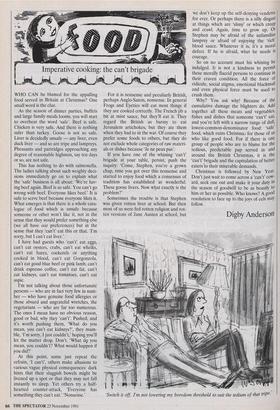Imperative cooking: the can't brigade
• • , =
WHO CAN be blamed for the appalling food served in Britain at Christmas? One small word is the clue.
As the season of dinner parties, buffets and large family meals looms, you will start to overhear the word 'safe'. Beef is safe. Chicken is very safe. And there is nothing safer than turkey. Goose is not so safe. Liver is decidedly unsafe — any liver, even duck liver — and so are tripe and lampreys. Pheasants and partridges approaching any degree of reasonable highness, say ten days or so, are not safe.
This has nothing to do with salmonella. The ladies talking about such weighty deci- sions immediately go on to explain what the 'safe' business is all about: 'We're hav- ing beef again. Beef is so safe. You can't go wrong with beef. Everyone likes beef.' It is safe to serve beef because everyone likes it. What emerges is that there is a whole cata- logue of food which is unsafe because someone or other won't like it, not in the sense that they would prefer something else .(we all have our preferences) but in the sense that they 'can't' • eat this or that. 'I'm sorry, but I can't eat liver.'
I have had guests who 'can't' eat eggs, can't eat oysters, crabs, can't eat whelks, can't eat hares, cockerels or anything cooked in blood, can't eat Gorgonzola, can't eat good blue beef or pink lamb, can't drink espresso coffee, can't eat fat, can't eat kidneys, can't eat tomatoes, can't eat aspic.
I'm not talking about those unfortunate persons — who are in fact very few in num- ber — who have genuine food allergies or those absurd and ungrateful wretches, the vegetarians — who are far too numerous. The ones I mean have no obvious reason, good or bad, why they 'can't'. Pushed, and it's worth pushing them, 'What do you mean, you can't eat kidneys?', they mum- ble, 'I'm sorry, I just couldn't,' hoping you'll let the matter drop. Don't. 'What d9 you mean, you couldn't? What would happen if you did?'
At this point, some just repeat the refrain, 'I can't', others make allusions to various vague physical consequences: dark hints that their sluggish bowels might be livened up a spot or that they may not fall instantly to sleep. Yet others try a half- hearted counter-attack, 'Everyone has something they can't eat.' Nonsense.'
For it is nonsense and peculiarly British, perhaps Anglo-Saxon, nonsense. In general Frogs and Eyeties will eat most things if they are cooked correctly. The French jib a bit at mint sauce, but they'll eat it. They regard the British as barmy to eat Jerusalem artichokes, but they ate them when they had to in the war. Of course they prefer some foods to others, but they do not exclude whole categories of raw materi- als or dishes because `Je ne pewc pas'.
If you have one of the whining 'can't' brigade at your table, persist, push the inquiry: 'Come, Stephen, you're a grown chap, time you got over this nonsense and started to enjoy food which a consensus of tradition has established as wonderful. These goose livers. Now what exactly is the problem?'
Sometimes the trouble is that Stephen was given rotten liver at school. But then most of us were fed rotten religion and rot- ten versions of Jane Austen at school, but we don't keep up the self-denying vendetta for ever. Or perhaps there is a silly disgust at things which are 'slimy' or which creep and crawl. Again, time to grow up. Or Stephen may be afraid of the unfamiliar lamprey or afraid of enjoying the 'rich' blood sauce. Whatever it is, it's a moral defect. If he is afraid, what he needs is courage.
So on no account must his whining be indulged. It is not a kindness to permit these morally flaccid persons to continue in their craven condition. All the force of ridicule, social stigma, emotional blackmail and even physical force must be used to crush them.
Why? You ask why! Because of the cumulative damage the blighters do. Add together all these meats and vegetables. fishes and dishes that someone 'can't' eat, and you're left with a narrow range of dull, lowest-common-denominator food: 'safe' food, which ruins Christmas for those of us who like good food. For if there is one group of people who are to blame for the tedious, predictable pap served in and around the British Christmas, it is the 'can't' brigade and the capitulation of better eaters-to their miserable demands.
Christmas is followed by New Year. Don't just wait to come across a 'can't' cow- ard, seek one out and make it your duty in the season of goodwill to be as beastly ro him or her as possible. Who knows? A good resolution to face up to the joys of eels may follow.
Digby Anderson
'Switch it off. I'm not lowering my boredom threshold to suit the tedium of that tripe.








































































 Previous page
Previous page